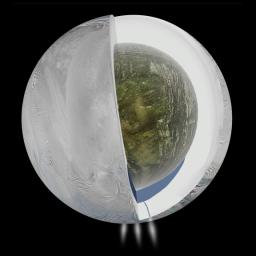Science
Related: About this forumBuried ocean on Enceladus
Enceladus, a small moon orbiting Saturn, has a watery ocean beneath its frozen surface, according to an analysis of data from NASA's Cassini spacecraft.
By Amina Khan

Saturn’s icy moon Enceladus has earned a certain amount of attention for its waterworks show — it was caught squirting plumes of mineral-rich water out of “tiger stripe” cracks near its south pole in 2005. Scientists thought that could be a sign of a liquid ocean beneath its frozen shell, but couldn’t be sure. Now, using data from NASA’s Cassini spacecraft, they have found gravitational evidence that a vast sea the size of Lake Superior could extend out from around the southern pole.
The discovery, described in the journal Science, lends support to the idea that this tiny world is one of the few places in our own solar system that could be potentially friendly to life.
At just 313 miles across, Enceladus is a frozen dirtball that’s too small to stay warm, so how could it have liquid water beneath the surface? The answer lies in its strange gravitational love triangle with ringed gas giant Saturn and Dione, another moon. Dione also tugs on Enceladus’s orbit, stretching its path around Saturn from a circle to an ellipse. The gravitational pull from these two bodies also squeezes and stretches the moon itself, and all that kneading from this tidal distortion heats Enceladus, melting some of the water ice under the surface.
Anyway, that’s the theory. The search for this subsurface ocean warmed up after scientists discovered plumes of mineral-rich water vapor squirting out of cracks near the south pole. But they couldn’t be sure it was coming from liquid water below, rather than from the ice at the surface.
more
http://www.latimes.com/science/sciencenow/la-sci-sn-enceladus-moon-saturn-water-ocean-life-20140403,0,4555926.story
Judi Lynn
(164,122 posts)Hidden ocean on Saturn's moon bolsters life theory
04 Apr 2014

Saturn's moon Enceladus is home to an ocean of melted water beneath its surface, and could be a source for alien microbes, scientists said.
The first measurements of the subsurface water at the south pole of the small and icy moon were made by the US space agency's Cassini spacecraft, and are described in the journal Science.
The body of water is about the size of Lake Superior, the second largest lake on Earth, and has a rocky bottom which could create conditions that allow tiny life forms to thrive.
Researchers first raised the possibility of a below-ground ocean on Enceladus in 2005, after water vapor was detected spewing from vents near the moon's southern pole.
More:
http://www.afp.com/en/news/hidden-ocean-saturns-moon-bolsters-life-theory
dipsydoodle
(42,239 posts)
Jets of water-ice are blasted thousands of km above the surface of Saturn's tiny moon Enceladus
The evidence for an "ocean" of water under the surface of Saturn's moon Enceladus appears to be overwhelming.
The little world has excited scientists ever since jets of icy material were seen squirting into space from a striped region at its south pole.
Now, exquisite measurements using Nasa's Cassini probe as it flew over the moon have allowed researchers to detect the water's gravitational signal.
Science magazine reports the details.
"The measurements that we have done are consistent with the existence of a large water reservoir about the size (volume) of Lake Superior in North America," Prof Luciano Iess told BBC News.
http://www.bbc.co.uk/news/science-environment-26872184
NickB79
(20,295 posts)We now have 5 worlds inside our own solar system (Mars, Europa, Callisto, Europa, Ganymede, and Enceladus) where we have good evidence liquid water once or still does exist. We also have another planetary body (Titan) which is far too cold for liquid water to exist upon, but instead has seas composed of liquid hydrocarbons in it's place.
Between the hypothesis that life could have been seeded from early Mars to Earthy by asteroid impacts, and the similar hypothesis that Earth then may have seeded life back outward itself, theoretically the solar system could be filled with chunks of rock bearing bacterial spores just waiting for a suitable habitat to grow in.
http://www.bbc.com/news/science-environment-25201572
They calculated how many Earth rocks big enough to shelter life were ejected by asteroids in the last 3.5bn years.
The Chicxulub impact was strong enough to fire chunks of debris all the way to Europa, they write in Astrobiology.
Thousands of potentially life-bearing rocks also made it to Mars, which may once have been habitable, they add.